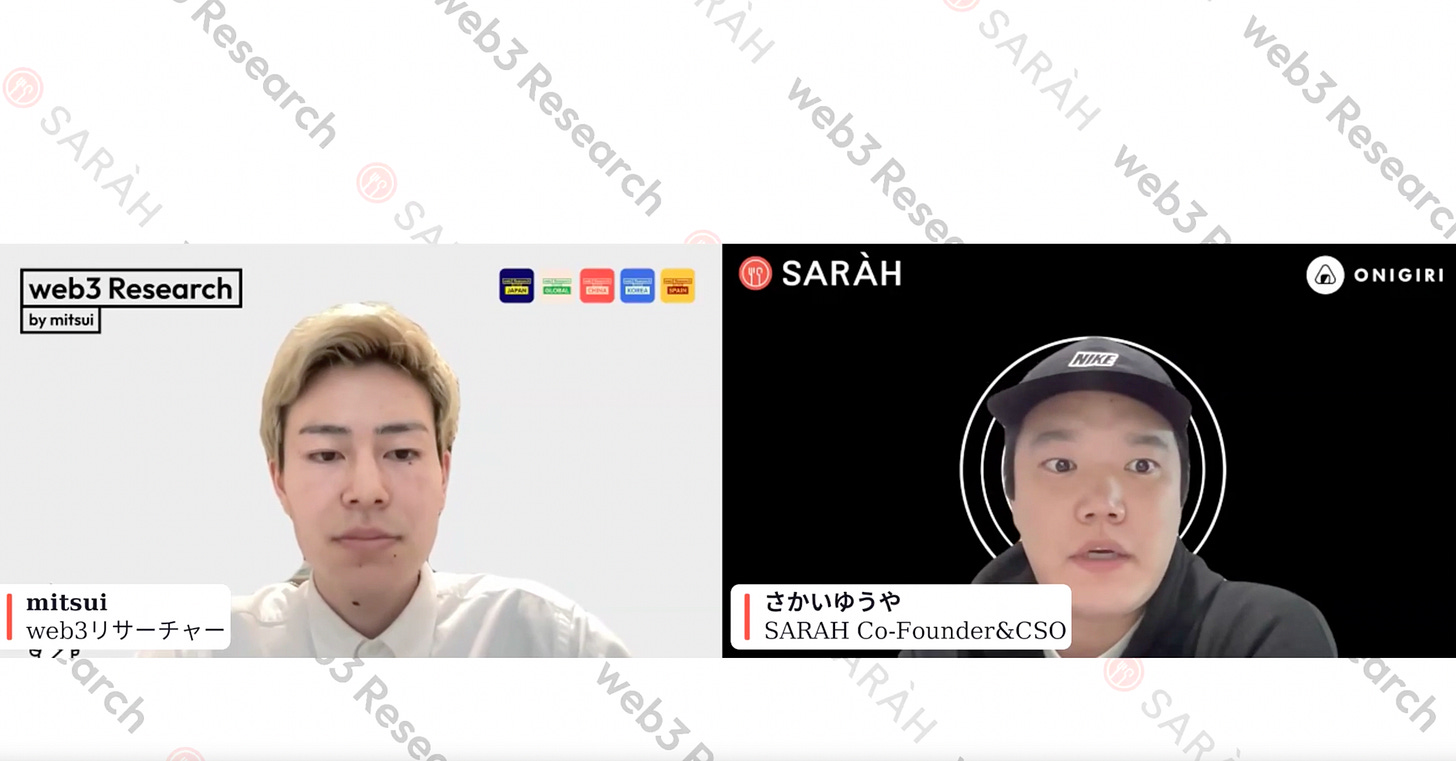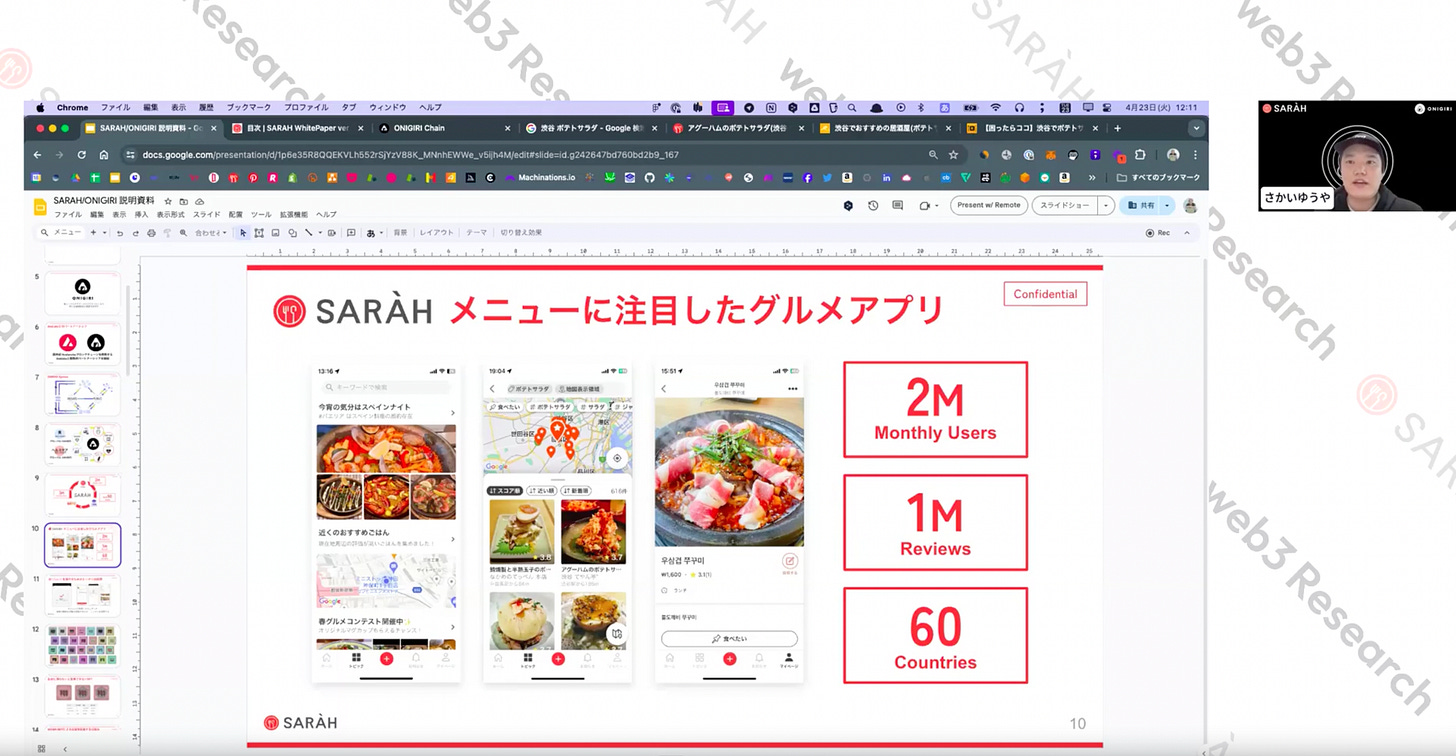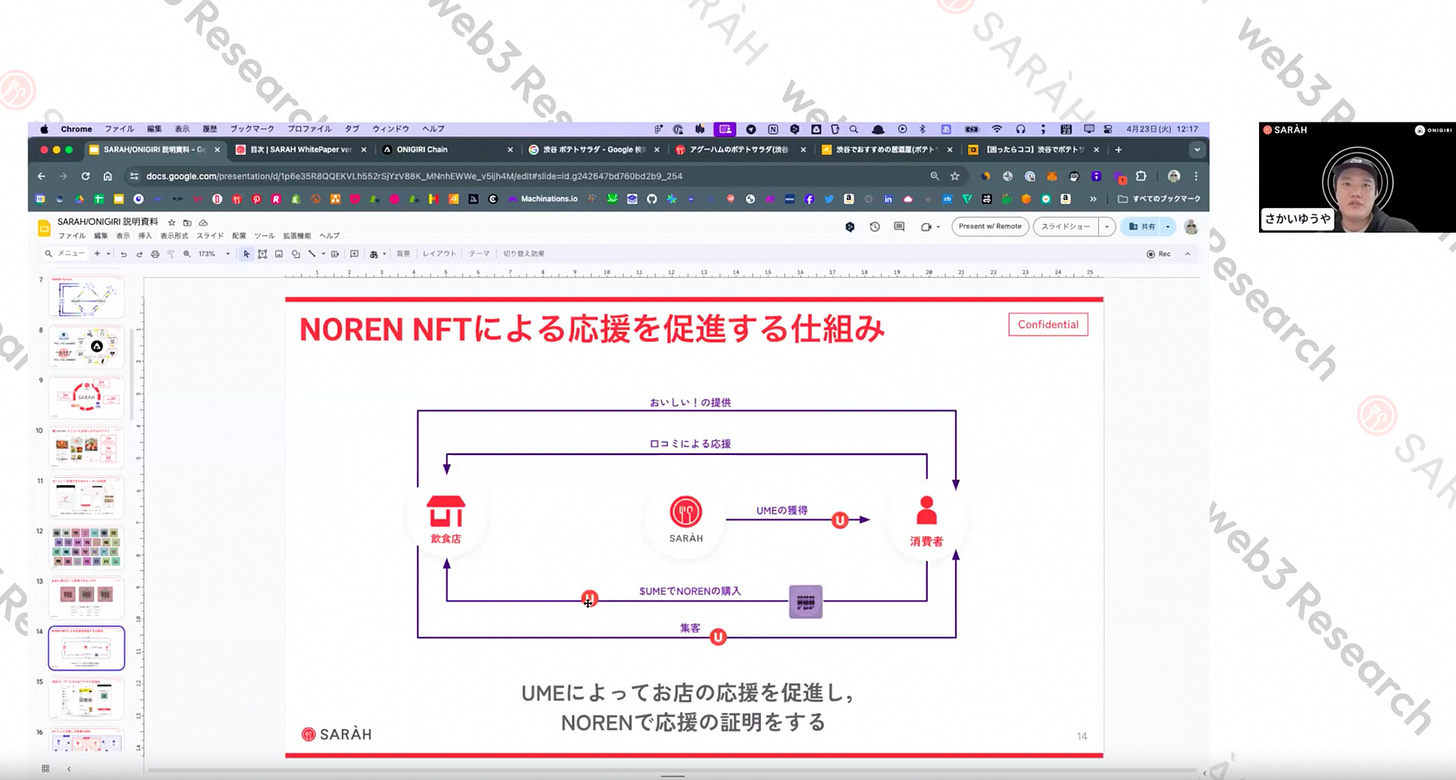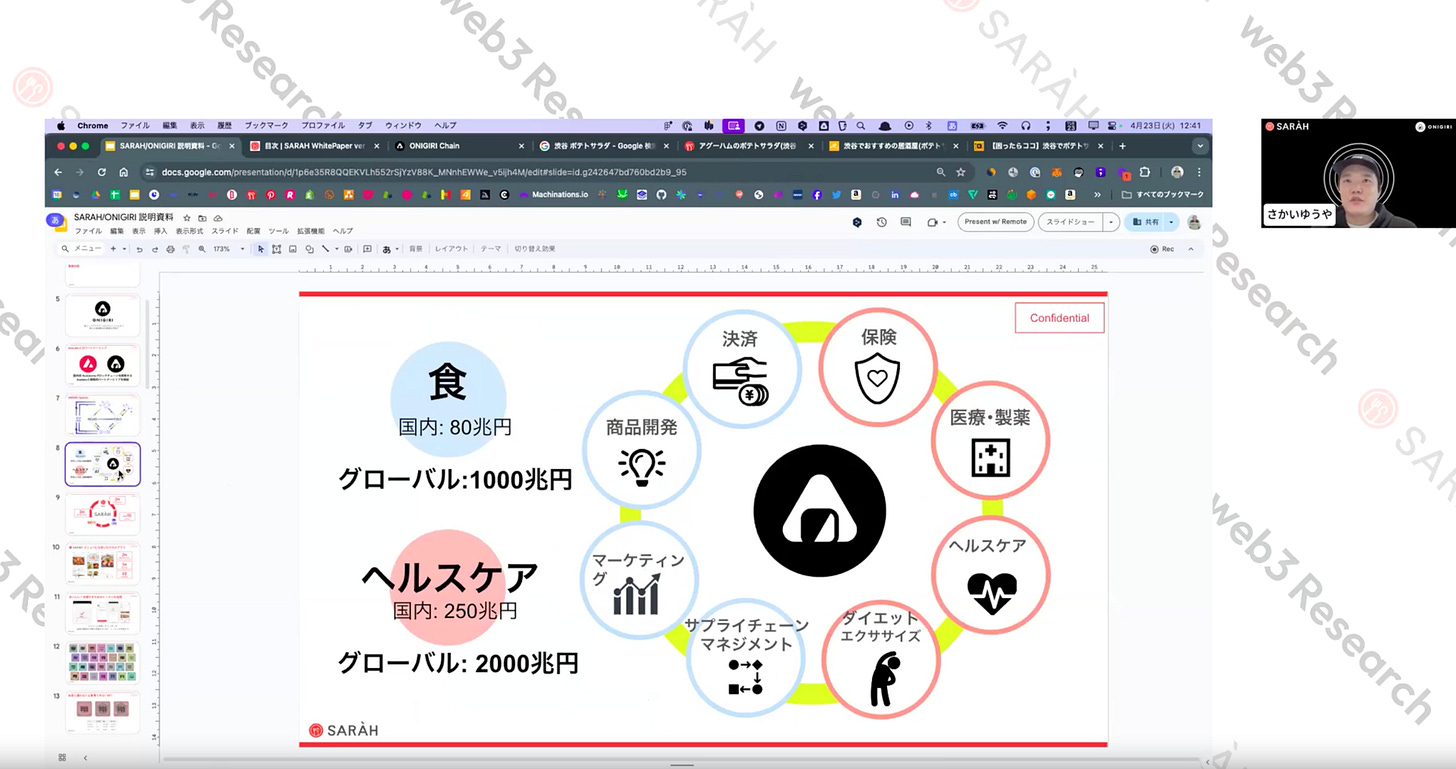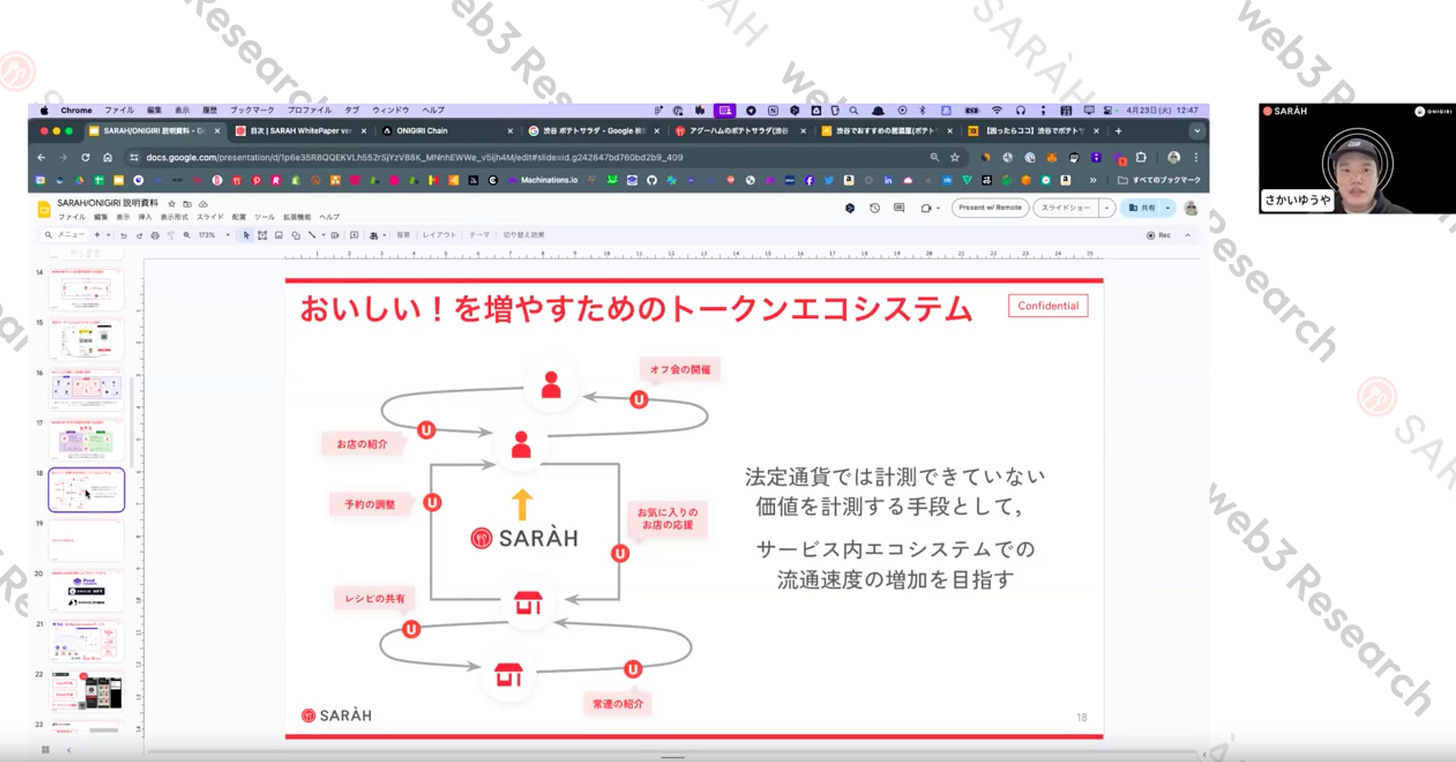What are "ONIGIRI Chain" and "NOREN NFT" by Gourmet app "SARAH"? / @SARAH__Gourmet
This is an interview with Yuya Sakai, Co-Founder & CEO of SARAH, a gourmet food application that utilizes web3.
Good morning.
This is mitsui from web3researcher.
Today'sarticle is an interview withYuya Sakai, Co-Founder & CEO of SARAH, agourmet food application that actively utilizes web3.
-First of all, please introduce yourself.
Yes, my name is Sakai from SARAH. I am the Co-Founder and Director CEO of SARAH Inc. and I am mainly in charge of strategy.I co-founded the company in 2014 with a college senior when I was a student and have been involved in management for 10 years. At the beginning of the company, we were building a web2 gourmet app, but I have personally been interested in web3 since I was a student. It wasn't until around 2017 that I started to get serious about it, and in 2021, the company took the helm to web3.
-You have been involved in gourmet-related services for a long time.
That's right. We have been operating the "SARAH" gourmet food posting application since that time, and the application itself has remained unchanged. We added the web3 elements such as tokens and NFT to it.
How and why did you become interested in -web3?
The professor of the seminar I was enrolled in during my college days was an expert on startups and technology, and had experience investing in Microsoft and other companies in Silicon Valley at the dawn of its history. He had experience investing in Microsoft and other companies in Silicon Valley at the dawn of the Silicon Valley era.
Around 2017, I personally started to get in touch with virtual currency and other such things, and was completely fascinated by the fun of it. On the other hand, our gourmet app "SARAH" is a CGM (Consumer Generated Media) model where users post reviews, and we were also in the business of selling review data collected through this model to food manufacturers, etc. I felt that the business structure of CGM and data sales had a high affinity with web3 elements, and started working in the web3 domain. I felt that the business structure of CGM and data sales had a high affinity with web3 elements, and began working in the web3 domain.
-I see that Dr. K. had a great influence on you. I think it's great that you foresaw the potential of blockchain even back then.
It really is. The professor was talking about the innovation and impact of technology from a time when the word web3 did not exist. I was skeptical at the time, but looking back, I am impressed with his foresight.
-Tell us about your products.
SARAH is a gourmet food application that allows users to post and search for food they have eaten on a menu basis. Other famous gourmet services generally collect reviews of the restaurants themselves. This is useful, for example, when you want to find a good Chinese restaurant in Shinjuku.
On the other hand, "SARAH" is unique in that it collects reviews that focus on individual menu items rather than restaurants. The service aims to respond to more specific needs, such as "I want to eat delicious Neapolitan in Shinjuku.
The impetus for founding the company came from the co-founder's desire to have a good potato salad in Shibuya. Searching for a place to eat potato salad, he could find a few places that had it, but he could not tell if it was good or bad. So, we decided to create a service to collect reviews of each menu item.
Currently, 2 million people use the site each month, and a total of more than 1 million word-of-mouth reviews have been collected from 60 countries in Japan and abroad. If I go to an izakaya and enjoy a delicious potato salad, I photograph and post only that menu item.
There were some individual bloggers who were disseminating information on a menu basis, but I think we were the pioneers as a platform. There are few similar services, not only in Japan but also overseas.
-How did you come to incorporate web3 elements into "SARAH"?
We also operate a BtoB service called "FoodDataBank," which analyzes word-of-mouth data collected by "SARAH" and provides it to food product manufacturers. We thought that a model in which user contributions are sold to companies would have a high affinity with web3-like elements.
Around 2020, when I was thinking about this, I decided to start up Discord as a user community for "SARAH" for now. Most of the users of SARAH had never heard of web3 or Discord, so we started with a closed community of about 100 people. The community was very active. Users started organizing off-line meetings and posting pictures of menu lists of restaurants one after another, and spontaneous activities were born. In just six months, 12,000 new menu items were registered.
Although there were no web3 concepts such as tokens, rolls, or incentive designs, users who shared SARAH's vision of "increasing the number of delicious experiences in the world" voluntarily took action. Therefore, we decided that tokens would be an effective way to further promote this activity, and we launched a new initiative.
Currently, we have introduced a system whereby users are given the token "UME" when they post to "SARAH" and can use it to acquire "NOREN NFT" for each restaurant. The "NOREN" acquired by users with "UME" will be returned to the restaurant as a token of support.
Although web3 has launched some web3-like measures such as issuing NFTs, some users who are not that familiar with web3 may feel that the hurdles are too high.
Therefore, we have taken advantage of Avalanche's subnet to be able to issue tokens and NFTs without the cost of gas. We are also incorporating a mechanism like ERC6551 that allows you to own NFTs without having a wallet, and we are working on ways to make it so that Web2 users can use it without any discomfort.
UME tokens are also currently running off-chain, but we are considering gradually moving them on-chain.
-How are users and stores responding?
Our users are almost exclusively Web2 users, so I don't think they are consciously buying NFT. However, "NOREN NFT" has minted about 100 units in 3 days of release. We feel that the purpose of most of the acquirers is to support their favorite stores and to show that they are contributors to those stores.
Those who hold NFTs have their names listed on the store's page. For example, there are three levels of "NOREN": fan, ambassador, and evangelist, and only those who have visited the store more than 12 times can obtain the NFT of evangelist, which is linked to the results of store visits. So a person with a high level "NOREN" can prove on the blockchain that he/she is a big fan of the store.
In the future, we are considering the use of "UME" tokens by stores to attract customers, etc. Currently, there is a daily limit on the number of "UME" tokens that can be earned, but there are possibilities for stores to distribute "UME" tokens beyond that limit. We are currently exploring the design of an ecosystem that is unique to tokens, rather than mere points.
-Is it necessary for stores to register with SARAH first in order to use the "UME" token to attract customers and use it for marketing?
Currently there is no such flow. The "NOREN NFT" for each store is created by our company on behalf of the store. We intend to return all "UME" tokens used to obtain "NOREN NFT" to the stores, but we think it will be easier for the stores to ask us, "Why don't we do this together? We think it will be easier to ask them to join us.
After that process is complete, we would like to make it possible for stores to receive "UME" tokens and use them for marketing and other purposes once they officially become a member of SARAH. We are aiming for an ecosystem where the more fans a store has, the more "UME" it can use.
-Why did you build the ONIGIRI Chain on the Avalanche subnet?
We did a lot of research about 2 years ago and found Avalanche to be easy to develop, with high customizability and gasless operation. We originally conceived of Avalanche as an infrastructure for issuing tokens and NFTs in the process of converting our own application "SARAH" to web3.
However, we began to think that if we were to build a blockchain, it could provide value not only to our own apps, but to the entire food and healthcare industry. For example, food-related data is distributed across various services, such as gourmet food apps, recipe apps, diet apps, and retail POS data, but we felt that the issue was that the same user data was not being linked.
It often happens that I lose track of which restaurant I bookmarked in Shibuya and which app I used to record it. We have also heard from diet app operators that they want data on dining out. We thought that these issues could be solved by creating a web3 data integration platform.
It would also be a waste to have the data you have collected disappear when the service ends. With a blockchain, data can be preserved semi-permanently. This led us to the concept of the ONIGIRI Chain, a public blockchain specialized for food and healthcare.
-You mentioned that you are separating the public and private chains to handle privacy sensitive data, can you elaborate a bit more on this?
Healthcare data, such as what users eat, medical history, weight, etc., is highly sensitive, so it is difficult to put it on a fully public chain. On the other hand, if you want to grant tokens as an incentive for providing data, a public chain is more suitable.
The data itself is stored on a private chain, and the "ONIGIRI" tokens are issued on the public chain as payment for providing the data. Avalanche Warp Message.
For validators on the private side, we would like to ask business companies in the food domain, such as Seven-Eleven and Ajinomoto. They should have a high need to utilize the data. We already provide a data analysis service called "FoodDataBank," and we are aiming for a model in which they can access data for a fee by becoming validators for the "ONIGIRI Chain" as well.
-Do you envision an increase in services such as SARAH, where users provide data?
Yes, we would like to have the data. Ideally, it would be great if we could get Eat Log and Cookpad to provide data. However, it will take time to make each company's service blockchain-compatible.
Therefore, we are preparing a service that allows anyone to easily issue NFTs. For example, by giving NFTs to people who eat retort curry made by House Foods, we can see who ate the curry on the blockchain and use it for marketing purposes. We hope to first promote the use of the ONIGIRI Chain from this angle.
Even if it is difficult to suddenly convert a web2 service to web3, tokenization through NFT is relatively easy to tackle. That is why we hope that by starting with NFT issuance support, we can become a data hub for the entire industry in the future, even if it is only our own infrastructure now.
-I understand the importance of data linkage, but there seems to be a dilemma on the part of companies that provide data, as they may lose their own competitive advantage. What are your thoughts on this?
I think you are right. Since data is a source of competitive advantage, it would be quite a hurdle to share data with competitors like Eat Log and Cookpad, for example.
However, the situation is different for businesses that provide systems to restaurants as their core business, such as mobile ordering services for restaurants. In fact, they have data in hand in the form of user order history, such as what kind of people are eating what kind of food. However, the business of using that data is not their core business, and they often fail to make good use of it.
I believe that there is a surprisingly large amount of such secondary data that is collected as part of one's core business but not fully utilized. If this data is put on the blockchain, it may be possible to create new value through incentives in the form of token rewards. For companies, this could be a new source of revenue in addition to not having to change their existing behavior. We believe that we can create a model that is beneficial to users as well.
-I see. It certainly seems that a win-win relationship can be established if it does not affect the business of the data provider.
That's right. In discussions about data integration and API integration, data pricing tends to be a vague black box. Neither the data provider nor the user knows what the appropriate price is.
To address this problem, we believe that a mechanism is needed to enable price formation based on market principles. Currently, however, there is no market to determine the price of data.
So we came up with the model of "provide us with data and we will grant you ONIGIRI tokens". If listed on an exchange in the future, a market price for the token will be formed. If the value of the token is linked to the value of the data provided, we believe that the market mechanism will be able to find a fair price for the data.
-For example, do we get ONIGIRI tokens for submitting to "SARAH"?
Currently, ONIGIRI Tokens are designed primarily for businesses. The image is that the information posted by users to "SARAH" is provided to the ONIGIRI Chain by a service called "SARAH", and the token is issued to us, the service operator.
In the future, it would be possible to give back tokens directly to users. However, since "SARAH" issues "UME" as its own in-app token, it may be possible to do the same with other services. In other words, the structure could be that each app token created on the ONIGIRI Chain is backed by the value of the ONIGIRI token.
-I see, so the ONIGIRI token becomes a common value base across various services.
I hope that will be the case. The UME tokens and NOREN NFTs issued by SARAH will circulate on the public side of the ONIGIRI token. It will be possible to visualize who has how many tokens and NFTs, which is a unique advantage of the blockchain.
-Do you envision the FoodDataBank, which is currently operating, being migrated to the blockchain?
Yes, with blockchain, it is possible to store personal dietary data over a span of decades and utilize it in fields such as medicine and drug discovery.
For example, if we could link the eating habits of a person in his/her 30s to his/her health condition when he/she reaches the age of 80, it would be useful for preventive medicine, etc. It may be possible to obtain knowledge such as "a person who eats ramen noodles three times a week is prone to this kind of disease. However, with the current Web2 methodology, it is difficult to continue to manage personal data over a span of 50 or 100 years.
In addition, the value of data increases as its use expands. If a person's dietary data is used only for product development and marketing at a particular time, its value will remain transitory, but if the range of uses can be expanded to include future areas such as medicine, pharmaceuticals, and insurance, the present value of each piece of data will increase even more. In other words, maximize the value of data both in terms of time and usage. We believe it is the power of blockchain that makes this possible.
Right now, FoodDataBank analyzes, visualizes, and sells data collected by "SARAH," but in the future, if everyone becomes a validator of the ONIGIRI Chain, services like FoodDataBank can be created. The democratization of data will lead to a wider range of value return. The value returned to data providers in this way will be used as a source of further investment in the industry. Our goal is to create such a virtuous cycle.
I'm not sure if you can answer this question, but is there a plan for SARAH to be operated as a joint-stock company, with the token issuer being a foundation, etc.?
As for the "SARAH" application, we plan to continue developing it in-house for now. On the other hand, we would like to transfer the "ONIGIRI Chain" to the Foundation as public goods. However, we are still considering the timing and method of doing so, given the fact that we started as a joint-stock company called "SARAH.
In the future, a move to an external public blockchain would have an impact on the current "SARAH" business model. In the extreme, though, data is the individual user's data, and companies are merely collecting it. The future may be an era in which the true value of a company will be tested in terms of how the data was collected and how it was analyzed. Of course, this is not an easy switch to make, but I believe it is necessary to keep such a thought in mind.
-I think one of the interesting things about "SARAH" is that you started with web2 and added web3 elements to it. It is unique in that it is not a token incentive from the beginning.
You are right. I have the impression that many web3 services are forcibly creating use cases with tokens. In contrast, SARAH only uses a web3 solution, and our vision is consistently to "increase the number of delicious experiences in the world". The point is that we encourage user loyalty and active activities, and use NFT to visualize and prove it.
In order to realize this goal, we are reexamining the significance of issuing tokens. The reason why "SARAH" issues "UME" tokens is to quantify values that cannot be measured in legal tender. For example, when users organize an off-line meeting or introduce a good restaurant to each other, they are increasing the number of delicious experiences for someone, but it is difficult to put a price on it. But it is true that the act itself has value. We designed the "UME" token to visualize that value.
The same philosophy applies to the "NOREN NFT. While most NFTs tout "with utilities," "SARAH" doesn't dare to specify utilities. We just prove that we are core fans who have been to the store more than 12 times and paid more than a fixed amount. The store will then voluntarily offer special services to such enthusiastic supporters. Companies can also use this service for targeted marketing.
There are also some interesting features unique to NFT. If you have a NOREN NFT of a popular restaurant, you can be granted privileges such as being able to apply for a reservation slot that is limited to goodwill holders. Then, when the store becomes so popular that reservations cannot be made, the value of the NFT will rise and trading will occur. As a result, more people would become aware of the store's existence and the circle of support would expand. We are considering the use of NFT to create such a virtuous cycle.
-As you mentioned earlier when you set up the Discord community, it was impressive to hear that users seem to share and understand the vision of "SARAH". Do you communicate carefully with users in order to build such relationships?
Yes, that's right. In fact, "SARAH" has been emphasizing dialogue with users since before we started working on web3. We regularly hold user meetups, and we have opportunities to visit not only Tokyo but also Osaka and Fukuoka to meet directly with users. We feel that our vision and thoughts are being conveyed through this communication.
In product development and marketing, we try to listen to our users, don't we? Thanks to this, we are beginning to have enthusiastic core fans. The other day, we received a happy comment from a customer who said, "Since I came to know about good restaurants through SARAH, I feel that my meals taste better now. We are really grateful to hear that much, and I think it shows the quality of the relationship we have with our users.
-I see. So "SARAH" has a solid community and culture to begin with, and then you add the web3 element to it.
That is correct. We have only chosen blockchain and web3 as a means to realize our vision, but the destination itself has not changed since the establishment of the company. The design concept of the service is to handle information not on a per-restaurant basis but on a per-menu basis, thereby promoting the distribution of information not only between restaurants and consumers but also across the entire food-related industry. This may be the difference between our service and other gourmet food services.
-It's true, the heat of the fans seems to be higher on a per-menu basis. Some may walk away with just potato salad.
I think you are right. The value of the platform will be further enhanced by attracting users who want to share the experience of good food with as many people as possible. We are in the process of building a service platform for this purpose, leveraging the power of web3.
-Finally, what is your outlook for the future?
In fact, the "SARAH" app white paper describes several concepts that we would like to work on in the future. Specifically, the amount of "UME" tokens to be awarded varies depending on the content of the postings, the algorithm of the app itself can be decentralized by introducing a ve token mechanism, a validator to ensure the reliability of reviews, and other such ideas are written on a memo basis. We are still in the early stages of both "SARAH" and "ONIGIRI Chain" and would like to add more and more interesting features that only Web3 can offer.
In addition, we have received a great deal of interest in the ONIGIRI Chain not only from the web3 industry, but also from major food manufacturers in the web2 industry. We would like to create a new infrastructure utilizing the blockchain in the fields of food and healthcare, which are Japan's strengths, and through this, provide new value not only to ourselves but also to the industry as a whole.
-Thank you very much! I'll try using SARAH too!
Yes, thank you!
"Official Link."
Disclaimer:I carefully examine and write the information that I research, but since it is personally operated and there are many parts with English sources, there may be some paraphrasing or incorrect information. Please understand. Also, there may be introductions of Dapps, NFTs, and tokens in the articles, but there is absolutely no solicitation purpose. Please purchase and use them at your own risk.
About us
A web3 newsletter delivered in five languages around the world. We deliver various articles about web3, including project explanations, news and trend analysis, and industry reports, every day. You can subscribe for $8 per month ($80 per year) and receive research articles that took 100 hours to complete every day.
Author
mitsui
A web3 researcher. Operating the newsletter "web3 Research" delivered in five languages around the world.
Contact
The author is a web3 researcher based in Japan. If you have a project that is interested in expanding to Japan, please contact the following:
Telegram:@mitsui0x
*Please note that this newsletter translates articles that are originally in Japanese. There may be translation mistakes such as mistranslations or paraphrasing, so please understand in advance.




